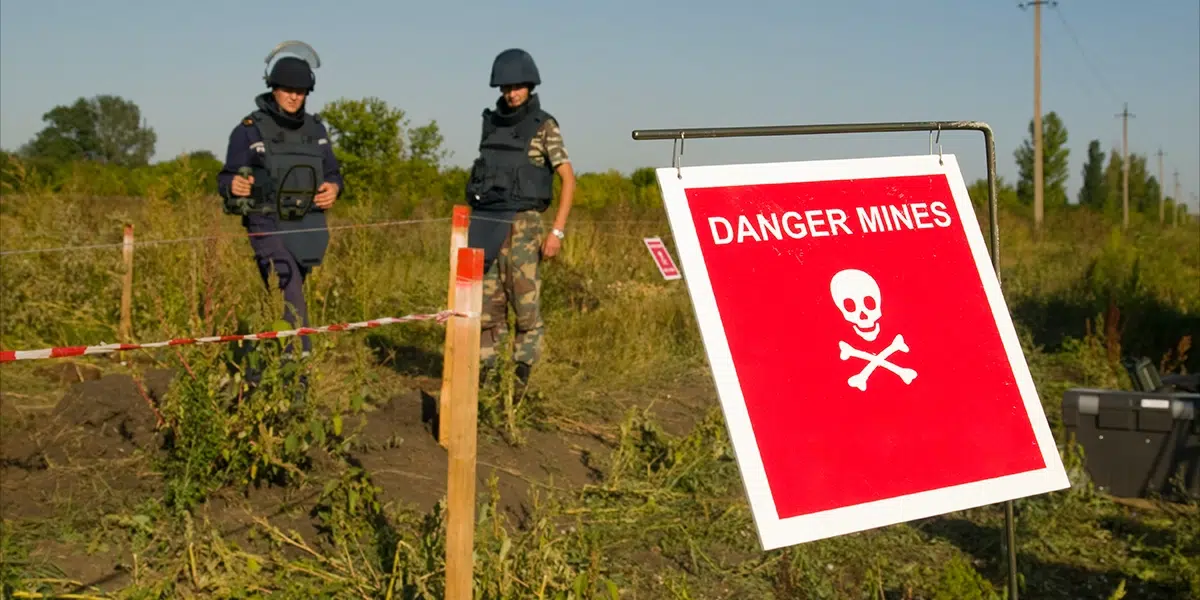YOU GOT THE POSITION... YOU'RE THE LEADER... NOW WHAT?
Menu

Have you ever stepped on a “landmine” as a leader?
You didn’t see it coming. It wasn’t obvious. That’s a landmine for you.
But you accidentally stepped on it, and an explosion ensued. You survived. Well, sort of. You sense things have changed. It feels obvious your leadership is undermined.
Leadership is influence. Anything that works against or undermines influence reduces your ability to lead.
This is the problem with landmines. When a leader stumbles upon one, the explosion damages the leader, and the shrapnel harms the team. The real damage is with trust.
Trust is the foundation of everything (and I mean everything). Trust determines a leader’s influence. When people trust their leader, the team functions well. People trust each other and believe in the leader. Trust grows leadership influence.
On the other side, when trust erodes, influence wanes. Trust takes time to build but only takes moments to destroy.
This is the real problem with leadership landmines. When a leader stumbles upon one, the explosion dings the leader. After all, the leader stepped on mine and created the explosion. The team catches shrapnel and loses influence.
It’s not easy. Landmines, by nature, are buried and hidden from sight. The only way to avoid a leadership landmine is to detect them before triggering them.
I’ve stepped on enough landmines to know how the explosion feels. My errors have also taught me how to detect them. Here are 10 landmines every leader should avoid:
Misunderstandings or lack of clear communication lead to issues. Effective leaders ensure clear, open, and honest communication. Clear communication should be easy, yet finding an organization that doesn’t struggle with communication is rare.
People desire and deserve clarity. Poor communications lead to misaligned efforts, destroying trust and harming effectiveness. To communicate clearly, do these things:
Rigid decision-making or not adapting to changing circumstances can explode your team. Leaders must make decisions, yet no leader is capable of ensuring every decision is the correct decision. Setting a direction is essential for your team. Adjusting as circumstances change is equally important.
NOTE: Make sure you reread number 1 if a change in direction is made!
No leader is talented enough to do everything that must be done. Trying to do everything leads to burnout and reduces team morale. Not to mention, refusing to delegate stagnates the growth of your followers.
I’ve written a lot about delegation. Here’s a post that may help if this is a struggle for you.
Not recognizing or addressing the team’s needs and morale can lead to a toxic work environment.
Your team isn’t a collection of Human Resources but a group of human beings. How we feel directly affects how we perform. It’s a leader’s job to asses team morale and work to resolve tensions, even when this means removing a team member.
Ethics and selfishness go hand in hand. Compromising on ethics or integrity can have long-term negative consequences. While it’s tempting to take advantage by violating ethics in a moment, once done, the explosion cannot be taken back. And the repercussions are significant.
Team members cannot trust unethical leaders. If a leader is willing to break an ethical code to get ahead, who’s to say they won’t equally harm you, too?
Not listening to feedback from team members or stakeholders can stunt growth and innovation. If you want your team to get better, you must be willing to improve.
Defensiveness is a landmine. When a person has something to say, allow them to say it. When people feel heard, they feel valued. And their feedback will help you lead better. While they may not fully understand your role, there is always something to learn from feedback.
Leaders need to develop their skills and knowledge continually. Leaders are learners. A leader who refuses to learn is a leader walking through a minefield.
People leave leaders, not organizations. In many cases, people leave when they feel they have nothing more to learn or no options to advance. A stagnant leader eventually finds themselves with a stagnant team. The best team members move on to better places, leaving their previous leader with only mediocrity.
Failing to develop future leaders can leave an organization vulnerable. Equally, failing to plan your transition can destroy everything you’ve worked to build. I wrote an entire book on leadership transitions if you want more content on this topic.
According to Peter Drucker, “Culture eats strategy for breakfast.” Assuming the values written on the way are the behaviors happening down the hall is dangerous. In most organizations, leaders take their eyes off the culture when values have been established and communicated. However, values without reinforcing behaviors become just words. Worst, other, hidden words fester into the actual values. If explicit behaviors don’t back up your stated values, the values become aspirational, not actual.
Not addressing conflicts effectively only escalates problems. Like ignoring culture, ignoring necessary conflict allows issues to fester. Because organizations are simply collections of people, unresolved conflict creates toxic relationships that undermine trust. Keeping short accounts is mandatory to avoid this landmine.
No leader intends to step on a landmine. Yet, they are hidden. When leaders intentionally look for and avoid these landmines, they thrive, and their teams progress. When leaders ignore the minefield, the only result is an explosion. Or three.
